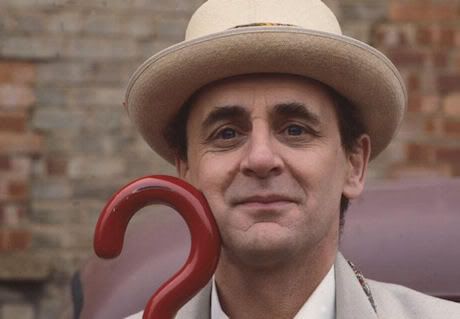 |
| For those of you who may have been wondering, it's not a fedora, it's a pork pie. |
Here, we start really getting into the category of my least favorites, rather than the ones I actually dislike. Sylvester McCoy was brilliant, there are just a lot of brilliant men ahead of him on my list. McCoy had one of the hardest acts to follow. Unlike Matt Smith and Peter Davidson who had to follow in the footsteps of the most popular Doctors of their eras, or Patrick Troughton who had to follow the original Doctor, Sylvester McCoy had to follow up the most unpopular Doctor in the history of the franchise. Colin Baker's era (not Colin Baker himself, the era, I need to stress that) nearly killed the series. The three years that they got with Sylvester McCoy seemed more like a courtesy granted by the BBC simply because the show was so iconic. The show lasted 26 seasons, but really, it was cancelled in season 22. McCoy was brought in as a very last ditch effort to save a franchise that was already doomed.
I've said it before and I'll say it again: Doctor Who is written on drugs. I don't know what their plan was to save the series after the Colin Baker era debacle, but it seemed to involve much harder drugs, because the 7th Doctor's episodes got fucking bizarre. On a Doctor Who message board, I once challenged anyone to try to explain to me the plot of the 7th Doctor episode, "Ghost Light." Surprisingly, several of them could explain it, although at least one of them admitted to be on drugs himself when watching the episode. But it's known that all of the actors in the episode were confused as fuck as to what was going on.
There also seemed to be a little bit of a "fuck you" to the critics of the 6th Doctor era during the 7th Doctor era. Because, while the show was trying to rebound from accusations of it being gruesome, dark, and starring a pretentious Doctor, they only fixed two of these three things. Sylvester McCoy was more likable, the stories got less visibly violent...but the Doctor got crueler. What Sylvester McCoy's Doctor is known for is for being a master manipulator. I truly believe that, when the 10th Doctor, in "The End of Time," talked about getting so good at killing that he could trick people into killing themselves, he was talking about the 7th Doctor. 7 was so jovial, like an eccentric (young) grandfather. But just beneath the surface was a boiling anger. And he didn't need to unleash that fury in a fiery rage. He would slowly manipulate his enemies into creating their own destruction for him. He didn't get mad. He got even. Few people complained about the violence in this era, because it wasn't as blatant. The Doctor didn't try to strangle his companion or throw someone in an acid bath, but he did destroy Skaro by simply leading the Daleks into thinking they wanted a certain object, a weapon, without telling them that it would actually destroy the planet. The extent to which the Doctor's pacifism applies to Daleks varies wildly, as it is certainly an interesting ethical conundrum for a pacifist to decide whether or not it's wrong to kill a living, sentient being whose only purpose in life is to kill. But in "Remembrance of the Daleks," the Doctor's speech to Davros as he and his planet burn together is bloodcurdlingly cold. Nothing Colin Baker's Doctor did was nearly as...devilish.
DAVROS: You have tricked me!
DOCTOR: No, Davros. You tricked yourself.
DALEK 2: Omega device returning.
DALEK: Impact minus twenty five.
DOCTOR: Do you think I would let you have control of the Hand of Omega?
DAVROS: Do not do this, I beg of you.
DOCTOR: Nothing can stop it now.
DAVROS: Have pity on me.
DOCTOR: I have pity for you.
DALEK: Fifteen.
DOCTOR: Goodbye, Davros. It hasn't been pleasant.
DAVROS: You have tricked me!
DOCTOR: No, Davros. You tricked yourself.
DALEK 2: Omega device returning.
DALEK: Impact minus twenty five.
DOCTOR: Do you think I would let you have control of the Hand of Omega?
DAVROS: Do not do this, I beg of you.
DOCTOR: Nothing can stop it now.
DAVROS: Have pity on me.
DOCTOR: I have pity for you.
DALEK: Fifteen.
DOCTOR: Goodbye, Davros. It hasn't been pleasant.

No comments:
Post a Comment